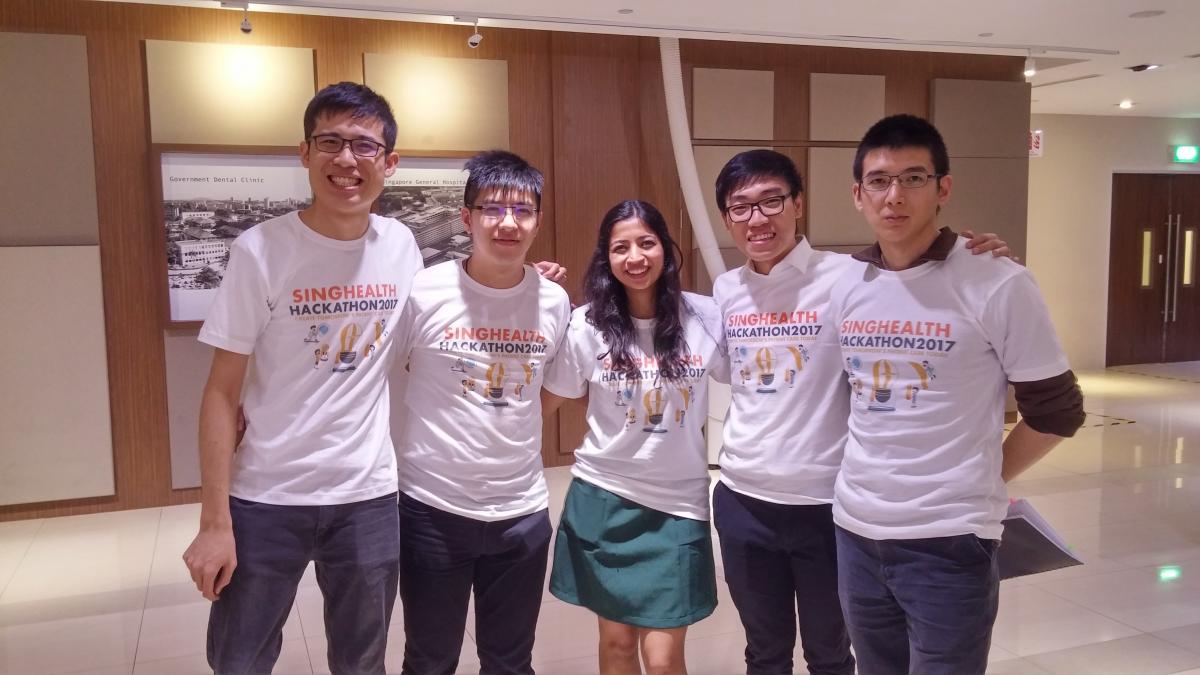Read our interview with Wharton Chan, who joined Duke-NUS Medical School in 2016 as an MD-PhD candidate after graduating with a Master of Biochemistry from University of Oxford.
 Wharton (2nd from left) with classmates at the SingHealth Hackathon 2017
Wharton (2nd from left) with classmates at the SingHealth Hackathon 2017
How did you decide on pursuing an MD-PhD?
For many science graduates in Oxford, one thing always lurks at the back of the mind – should I do a PhD? Some dismiss this straight away, as lab work may not be the most enticing sort of career; but for many others, the Part II research experience provides a change in perspective, and may reassure thoughts of a research career. I fall into the latter group – it seemed that I was good at research, I enjoyed research, and it was ‘the right thing to do’.
It turns out that I wasn’t wrong, but I wasn’t completely right either. In my Part II (of MBiochem), I happily worked in Prof. Julian Knight’s group, a group working on immunogenetics in the Wellcome Trust Center of Human Genetics. It was then that I came to know three clinician scientists, i.e. medical doctors who did research; one of them was my PI. I started to ponder in their perspective, and also the unique niche that they were filling. Was it possible to treat patients and perform high quality research? And how did the two careers complement each other? As I continued to analyse my data, which incidentally was collected and processed by one of the clinician scientists, it seemed apparent to me that it was one of the careers I would consider.
Why did you decide to apply to Duke-NUS Medical School?
As I carried out my research at Oxford, I came across Duke-NUS Medical School, a graduate medical school strategically located in the biomedical hub of Asia, Singapore. Apart from having a vibrant research environment around, the four-year curriculum also included nine months for students to perform research, whether clinical or lab based. This seemed to fit with my interests, as the school strives to educate and train clinicians with a research mind set, and it was a school for graduates only too! Whilst the course continued to check my boxes, I was also happy to know that there is the option to extend the nine month research work into a PhD, averaging 4 years. For someone like me with a strong interest research, this was ideal, as I didn’t have to compromise my research career to pursue a clinical career, but could instead have the two synergize with each other.
Tell us about your experience in the MD programme.
Having been here for over half a year now, I am nearing the end of my pre-clinical studies and in July I will be heading to the wards for clerkships. This is similar to most other Graduate Medicine programmes in UK, where most of the pre-clinical training is done early on. However, since there is a nine month research project set out within the four year MD course, pre-clinical studies in this programme is done in a condensed and high throughput manner. While it may sound daunting, I must say that the school very much plays to the strength of having a class consisting only of graduates: in different topics, people from different backgrounds draw different insights and bring new elements to the classroom. The school is also non-discriminatory towards the undergraduate background of applicants: I have classmates from Law, Business, Engineering etc.
Another beauty of the pre-clinical portion of the programme is the emphasis on team-based learning, which again draws in strength of different backgrounds and also allows strong peer learning. There is nothing similar to cracking a case with your friends and teammates, then bringing it to a big discussion with the class. Since the class size is small (~60), this mode of learning really stimulates and accelerates the learning required, as supposed to the traditional lecture style. From my own experience, information discussed in class is much more permanent than something that is absorbed in lectures. In that respect, it may sound very different from UK education, but it is fun and effective.
Anything you’d like to say to prospective applicants?
If you’re like me, i.e. someone who has a hunger for research but may want to develop a concurrent medical career as well, then Duke-NUS is the place. Otherwise, if you’re looking for an alternative experience for a Graduate Medicine programme, then Duke-NUS is a school with great opportunities and top-tiered education.
Want to know more? Contact Wharton at e0026312@u.duke.nus.edu